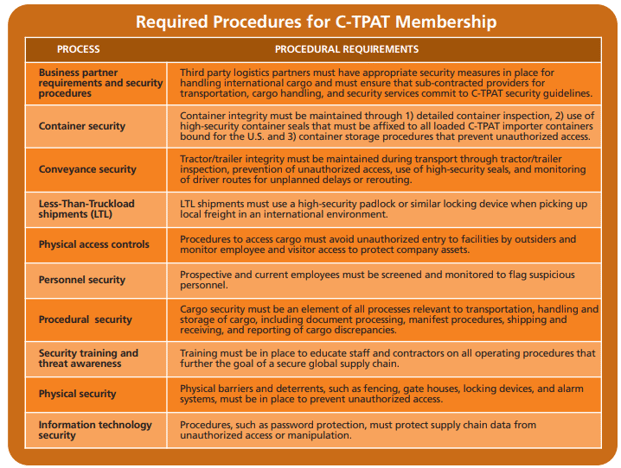Created in the aftermath of 9/11, the Customs Trade Partnership Against Terrorism (C-TPAT) was formed to strengthen and protect foreign trade and U.S. border security. It is a private-public partnership between the U.S. Customs and Border Protection (CBP) and companies such as importers, exporters and many other supply chain professionals. By pursuing C-TPAT certification, member companies can enjoy a variety of supply chain benefits that can boost operational safety and efficiency. For some companies, however, these benefits may not outweigh the effort needed to meet requirements.
What is C-TPAT certification?
 Companies who become C-TPAT-certified agree to implement the program’s specific security requirements. These requirements extend to all elements and participants in a given company’s supply chain, including manufacturing and distribution facilities, third-party logistics providers (3PLs), and carrier partners.
Companies who become C-TPAT-certified agree to implement the program’s specific security requirements. These requirements extend to all elements and participants in a given company’s supply chain, including manufacturing and distribution facilities, third-party logistics providers (3PLs), and carrier partners.

What are the benefits of C-TPAT certification?
By complying with these certification requirements, member companies can enjoy a variety of benefits. First and foremost is the knowledge that a company is doing its part to make the supply chain – and the country – safer. And, by complying with the program’s requirements, each company is likely taking great strides in making its own operations safer and more secure.
Next, the cargo of C-TPAT member companies is 4-6 times less likely to be flagged for inspection by the CBP. This saves companies substantial amounts of time and money as inspections can delay a product in getting to market by up to 2 weeks – angering your customers, extending the cash cycle, and resulting in added costs in the form of a Central Examination Station (CES) exam. In the event that cargo of a C-TPAT member is selected for inspection, it will move to the front of the line.
C-TPAT member companies may also gain favor with retailers. Many retailers take ownership of goods overseas and want to ensure no one has tampered with the goods at the factory or overseas port. While C-TPAT compliance is not the reason retailers seek out a company’s products, it can tip the scales in its favor at the tail end of a vendor selection process.
According to the CBP, additional benefits of C-TPAT certification include:
- Assignment of a Supply Chain Security Specialist to the company
- Access to the Free and Secure Trade (FAST) Lanes at the land borders
- Access to the CTPAT web-based Portal system and a library of training materials
- Eligibility for other U.S. Government pilot programs, such as the Food and Drug Administration’s Secure Supply Chain program
- Business resumption priority following a natural disaster or terrorist attack
Perceived barriers to C-TPAT certification
While thousands of companies (over 11,400 of them) have already recognized these benefits and taken the steps for certification, other companies aren’t sure that the effort to meet all the requirements is worth it – particularly companies with very few current border inspections.
There are also companies who cannot benefit from C-TPAT membership. Smaller shippers who ship LTL and LCL can’t take advantage of expedited processing, which applies only to loads that are 100% C-TPAT cargo. Companies under regulation from more than one government agency (e.g., FDA, USDA) are also unable to benefit.
Working with 3PLs
If you are outsourcing any portion of your supply chain to 3PLs, their security procedures come under just as much scrutiny as your own during C-TPAT evaluations. So, if you are considering membership, it helps to work with 3PLs that are well-versed in C-TPAT protocols. 3PLs that have partnered with clients throughout their own certification processes will have all the required SOPs in place, and may even enjoy working relationships with U.S. Customs representatives. As a result, 3PLs can speed the certification process.
To learn more about how an experienced 3PL can help you navigate C-TPAT and other CBP programs, contact Weber Logistics today.





 Capital Management
Capital Management